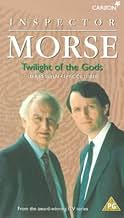When Gwladys Probert, a world-renowned mezzo-soprano, is shot by a sniper at Oxford, Morse, one of her biggest fans, sees a link with an earlier murder of a freelance journalist.When Gwladys Probert, a world-renowned mezzo-soprano, is shot by a sniper at Oxford, Morse, one of her biggest fans, sees a link with an earlier murder of a freelance journalist.When Gwladys Probert, a world-renowned mezzo-soprano, is shot by a sniper at Oxford, Morse, one of her biggest fans, sees a link with an earlier murder of a freelance journalist.
- Director
- Writers
- All cast & crew
- Production, box office & more at IMDbPro
Featured reviews
Being a Wagner enthusiast, the title would imply much Wagnerian background music which was curiously lacking for the most part. I had expected a comment from Morse when the repetiteur played the Tristan chord but none was forthcoming!
I won't waste any more time other than to say that this episode is most uncharacteristic and bears no resemblance to the classic Morse approach.
Horrible.
The murder(s) are rather irrelevant, what matters in this case are the character descriptions, some funny scenes (yes, Lewis can be "attractive" to cultured Vavasseur :)) and Brigitte de Plessy's rather odd explanation on how sex life ruled the diva's frequent staff changes and relationship with her nice sister (all in all, a botched attempt in terms of plot, but interesting hypothesis anyway). For cinema buffs, Arabella Baydon was, yes, Rachel Weisz, looking incredibly young, and probably more beautiful than ever. Andrew Baydon's take on Oxford: "when will it modernize" and the answer it gets "Why should it?" are also part of the "jewels", like Gentile Bellocchio's short but expressive monologue on why, being a mediocre artist, he could be in help of a bigger Artist, and that was all there was for him.
Morse says near the end his "philosopical" credo: "Between Art and life, given people like Baydon, I choose Art". No wonder we witness him standing up and cheering for the diva, but following his police duties begrudgingly. But for when there's an opportunity for an ironic remark or a sneer. Or a beer :). One just can't say enough good things about John Gielgud.
I wonder how good would Morse be as an Art critic, if being a police inspector is definitely not what he likes best...
Did you know
- TriviaThe character of Andrew Baydon was based on disgraced newspaper publisher Robert Maxwell.
- GoofsDuring the standing ovation, Morse shouts "Bravo!". However, as the singer is female, he should use the female form, which is "Brava!"
- Quotes
Detective Sergeant Lewis: You ought to get off home. You look done in.
Chief Inspector Morse: [Depressed] I am... done in.
Chief Inspector Morse: [He puts down his pen and sighs] Art and life, Lewis. Art and life.
Detective Sergeant Lewis: Oh, yeah?
Chief Inspector Morse: Always preferred art myself. Don't know about life. And when I meet people like Baydon, I'm not that sorry but... Today, I suppose because I've always thought art was... because it gave me so much... I've always thought of artists as... as being something different.
Detective Sergeant Lewis: My dad used to love football - but he didn't like footballers. You have to keep the people that do things apart from what they do. That's what he said.
- ConnectionsEdited into Inspector Morse: Rest in Peace (2000)
- SoundtracksGötterdämmerung
Composed by Richard Wagner
Details
- Release date
- Country of origin
- Official site
- Language
- Filming locations
- Newark Priory, River Wey, Ripley, Surrey, England, UK(Body discovered)
- Production companies
- See more company credits at IMDbPro






















